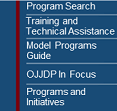The Internet Crimes Against Children Task Force Program (ICAC program) helps state and local law enforcement agencies develop an effective response to technology-facilitated child sexual exploitation and Internet crimes against children. This help encompasses forensic and investigative components, training and technical assistance, victim services, and community education.
The program was developed in response to the increasing number of children and teenagers using the Internet, the proliferation of child sexual abuse images available electronically, and heightened online activity by predators seeking unsupervised contact with potential underage victims. OJJDP created the ICAC Task Force Program under the authority of the fiscal year (FY) 1998 Justice Appropriations Act, Public Law 105–119. The Providing Resources, Officers, and Technology to Eradicate Cyber Threats to Our Children Act ("the PROTECT Act") of 2008, (P.L. 110-401, codified at 42 USC 17601, et seq.), authorized the ICAC program through FY 2013.
The ICAC program is a national network of 61 coordinated task forces representing over 3,500 federal, state, and local law enforcement and prosecutorial agencies. These agencies are engaged in both proactive and reactive investigations, forensic investigations, and criminal prosecutions. By helping state and local agencies to develop effective, sustainable responses to online child victimization – including responses to the online sharing of child sexual abuse images, OJJDP has increased the capacity of thousands of communities across the country to combat Internet crimes against children. For information on ICAC Task Forces by state, please visit www.icactaskforce.org
Since the ICAC program's inception in 1998, more than 500,000 law enforcement officers, prosecutors, and other professionals have been trained on techniques to investigative and prosecute ICAC related cases.
Since 1998, ICAC Task Forces have reviewed more than 580,000 complaints of alleged child sexual victimization resulting in the arrest of more than 60,000 individuals.
In 2015, ICAC task force programs conducted more than 54,000 investigations and 61,000 forensic exams. These efforts resulted in the arrests of more than 8,500 individuals. Additionally, the ICAC program trained over 34,000 law enforcement personnel, over 3,600 prosecutors, and more than 9,400 other professionals working in the ICAC field. | 


